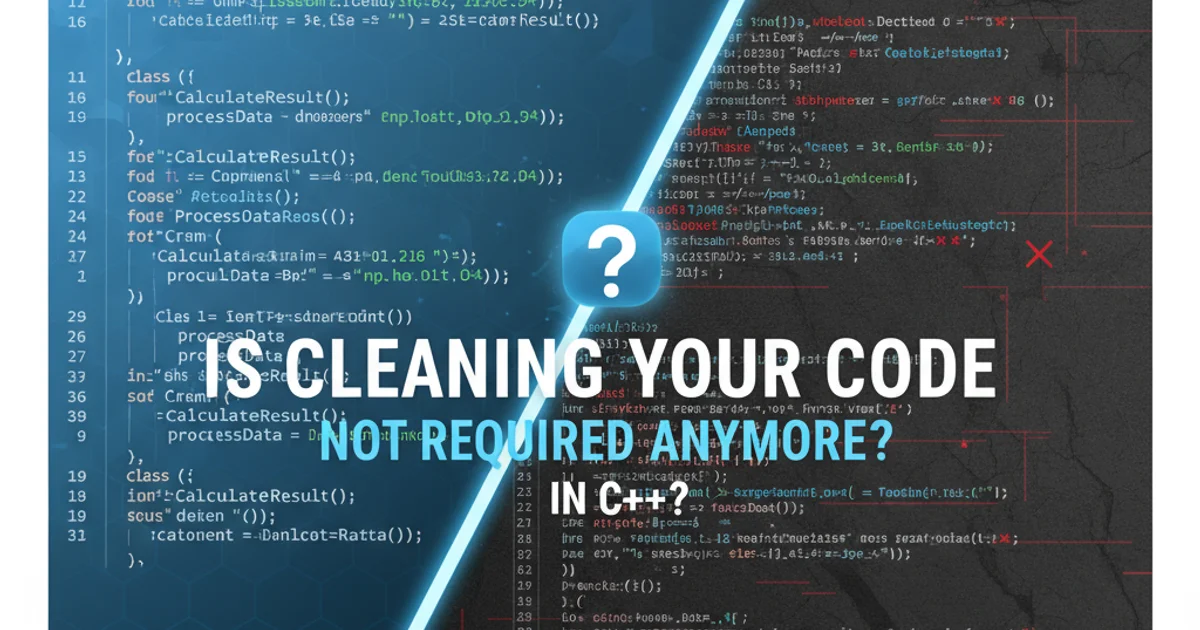Is cleaning your code not required anymore in C++?
Categories:
Is Cleaning Your Code Not Required Anymore in C++?

Explore the evolving landscape of C++ development, examining how modern language features and tools impact the necessity and methods of code cleaning.
The question "Is cleaning your code not required anymore in C++?" might seem provocative, especially to seasoned developers who have spent countless hours refactoring and adhering to strict coding standards. However, with the rapid evolution of C++ (C++11 and beyond) and the proliferation of sophisticated tooling, the nature of code cleaning has certainly changed. This article delves into how modern C++ features, automated formatters, static analyzers, and linters have transformed the landscape, making some traditional manual cleaning tasks less critical, while emphasizing others.
The Rise of Modern C++ Features
C++11 introduced a plethora of features that inherently lead to cleaner, more expressive, and often safer code. Concepts like auto, range-based for loops, smart pointers, and move semantics reduce boilerplate, prevent common errors, and improve readability. While these features don't eliminate the need for good design, they provide more elegant ways to express intent, thereby reducing the amount of code that might need 'cleaning' due to verbosity or manual resource management.
#include <iostream>
#include <vector>
#include <memory>
// Before C++11 (manual resource management, verbose iteration)
void old_style_code() {
int* arr = new int[5];
for (int i = 0; i < 5; ++i) {
arr[i] = i * 10;
}
for (int i = 0; i < 5; ++i) {
std::cout << arr[i] << " ";
}
std::cout << std::endl;
delete[] arr; // Manual cleanup
}
// With C++11 (smart pointers, range-based for loop)
void modern_cpp_code() {
auto vec = std::vector<int>{10, 20, 30, 40, 50};
for (const auto& val : vec) { // Range-based for loop
std::cout << val << " ";
}
std::cout << std::endl;
// Smart pointer for automatic memory management
auto ptr = std::make_unique<int>(100);
std::cout << *ptr << std::endl;
}
int main() {
std::cout << "Old style: ";
old_style_code();
std::cout << "Modern C++: ";
modern_cpp_code();
return 0;
}
Comparison of C++ code before and after C++11 features, showing reduced boilerplate and improved safety.
std::unique_ptr, std::shared_ptr, auto, and range-based for loops. They not only make your code more concise but also inherently safer and easier to maintain, reducing the need for manual 'cleaning' of common pitfalls.The Role of Automated Tools
Perhaps the most significant shift comes from the widespread adoption of automated tools. Formatters like clang-format, static analyzers like Clang-Tidy and Cppcheck, and linters can automatically enforce coding styles, detect potential bugs, and suggest improvements. These tools handle the tedious, mechanical aspects of code cleaning, freeing developers to focus on higher-level architectural and design concerns. This doesn't mean cleaning is obsolete; it means the how and who of cleaning have changed.
flowchart TD
A[Developer Writes Code] --> B{Automated Formatting (clang-format)}
B --> C{Static Analysis (Clang-Tidy, Cppcheck)}
C --> D{Linter Checks (e.g., Google C++ Style)}
D --> E{Code Review (Focus on Logic/Design)}
E --> F[Clean, High-Quality Code]
C --"Suggests Fixes"--> A
D --"Flags Style Violations"--> AAutomated Code Cleaning Workflow in Modern C++ Development
Automated tools excel at consistency. They ensure that indentation, brace placement, naming conventions, and even complex refactorings (like using override or final) are applied uniformly across a codebase. This consistency is a cornerstone of clean code, making it easier for multiple developers to collaborate and understand each other's work without being distracted by stylistic differences.
What Still Requires Manual Cleaning?
Despite the advancements, human judgment remains indispensable for certain aspects of code cleaning. Automated tools are excellent at syntax, style, and detecting common anti-patterns, but they struggle with:
- Architectural Debt: Poor design choices, tightly coupled components, or violations of SOLID principles often require significant refactoring that goes beyond what a tool can automate.
- Semantic Clarity: Ensuring variable names are truly descriptive, functions have a single responsibility, and comments explain why something is done (not just what) still requires human insight.
- Performance Optimization: While some tools can flag inefficient loops or memory access patterns, deep performance tuning often involves understanding the specific context and algorithms, which is a manual task.
- Testability: Designing code to be easily testable is a fundamental aspect of clean code that tools can't enforce directly, though they can help identify patterns that hinder testability.
In conclusion, the need for clean code in C++ is as strong as ever, but the methods have evolved. Developers are now empowered by powerful language features and sophisticated tools that automate many of the mundane cleaning tasks. This shift allows them to elevate their focus to more complex design, architectural, and semantic aspects, ultimately leading to higher quality, more maintainable C++ applications.